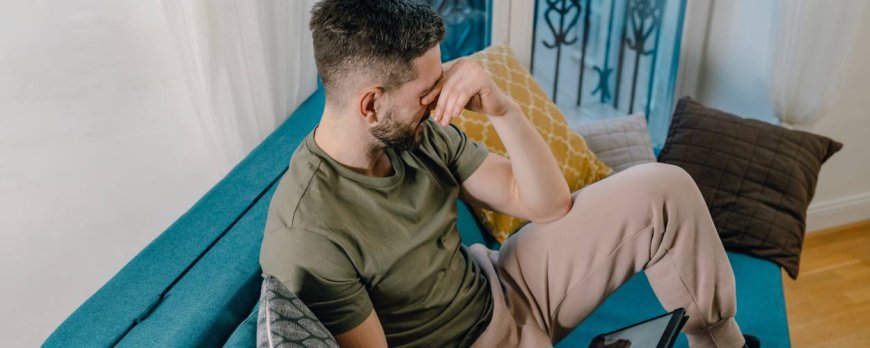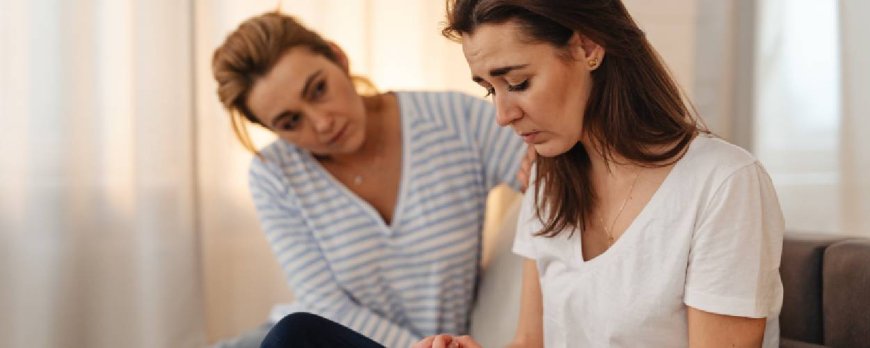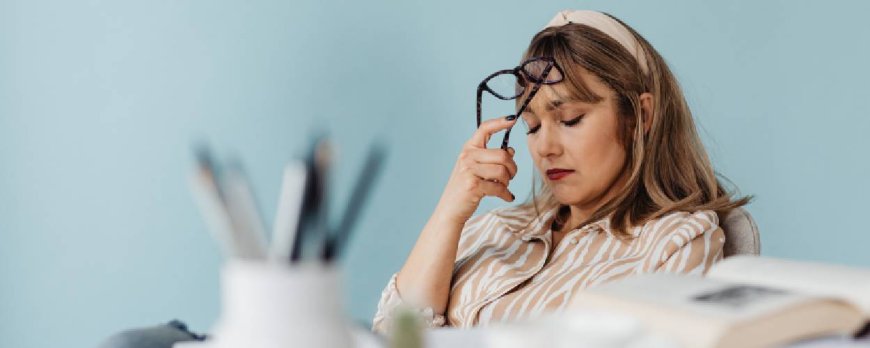When anxiety becomes too much?
Explore "When anxiety becomes too much?" Uncover signs, symptoms and coping strategies for overwhelming anxiety in our comprehensive guide.

When Anxiety Becomes Too Much?
Excessive anxiety can significantly disrupt a person's ability to function and negatively impact their overall well-being. Anxiety disorders, characterized by frequent, excessive worry that is hard to control, can make daily life challenging. Symptoms of an anxiety disorder include avoiding anxiety-inducing situations, changes in eating habits, chronic pain, difficulty concentrating, fatigue, feelings of fear or panic, headaches, gastrointestinal issues, hyperventilation, inability to control worry, increased heart rate, poor quality of life, shaking, sweating,
and trouble sleeping. Various factors can contribute to anxiety disorders, such as health issues, chronic stress, drug or alcohol abuse, family history of anxiety disorders, medication side effects, other mental health issues, personality traits, and trauma or abuse.
Seeking support from a doctor or mental health professional is crucial if anxiety becomes difficult to control, is accompanied by symptoms of depression, involves substance abuse, or affects physical health.
Managing anxiety effectively requires a multifaceted approach. Lifestyle changes like allowing oneself to feel anxiety, deep breathing, exercise, listening to relaxing meditation audio or music, making healthy food choices, paying attention to media consumption, practicing good sleep hygiene, and taking technology breaks can help reduce anxiety.
Psychotherapy, including cognitive behavioral therapy, exposure therapy, acceptance and commitment therapy, dialectical behavioral therapy, and eye movement desensitization and reprocessing, as well as medication such as selective serotonin reuptake inhibitors, serotonin-norepinephrine reuptake inhibitors, benzodiazepines, and tricyclic antidepressants, may be used to treat anxiety disorders.
Alternative or complementary treatments like relaxation techniques, meditation, yoga, acupuncture, and exercise can also help alleviate anxiety symptoms.
It is essential to seek help for debilitating anxiety and develop coping tools and strategies to manage anxiety effectively.
Key Takeaways:
- Excessive anxiety can significantly disrupt a person's ability to function and negatively impact well-being.
- Anxiety disorders are characterized by frequent, excessive worry that is hard to control.
- Common symptoms of anxiety disorders include avoidance, changes in eating habits, chronic pain, difficulty concentrating, and fatigue.
- Anxiety can be caused by various factors, including health issues, chronic stress, and trauma or abuse.
- Seeking professional help is important when anxiety becomes difficult to control or affects physical and mental health.
- Lifestyle changes, psychotherapy, medication, and alternative treatments can aid in the effective management of anxiety.
Signs of Excessive Anxiety
Recognizing the signs of excessive anxiety is crucial in identifying when anxiety becomes too much to handle. Anxiety disorders can manifest in various ways, both physically and emotionally. It is important to pay attention to these signs to seek appropriate support and treatment. Here are some common symptoms to look out for:
- Avoidance behavior: Individuals with excessive anxiety may try to avoid situations or activities that trigger their anxiety. This can lead to social isolation and difficulties in daily functioning.
- Physical symptoms: Anxiety can manifest as chronic pain, gastrointestinal issues, headaches, hyperventilation, increased heart rate, shaking, sweating, and other physical sensations.
- Emotional changes: Anxiety disorders can cause feelings of fear, panic, and an inability to control worry. It may also result in changes in eating habits, difficulty concentrating, fatigue, and trouble sleeping.
If you experience these symptoms frequently and they significantly interfere with your daily life, it may be a sign of an anxiety disorder. It is important to reach out to a healthcare professional or mental health specialist for an accurate diagnosis and appropriate treatment options.

Causes of Anxiety Disorders
Anxiety disorders can arise from a combination of genetic, environmental, and psychological factors. Understanding the root causes of anxiety can help individuals and healthcare professionals develop effective treatment plans and coping strategies.
Genetic Factors: Research suggests that there may be a genetic predisposition to anxiety disorders. Individuals with a family history of anxiety disorders are more likely to develop the condition themselves. Certain genes and neurochemical imbalances in the brain may contribute to increased vulnerability to anxiety.
Environmental Factors: Trauma or abuse, such as physical or emotional abuse, can significantly increase the risk of developing an anxiety disorder. Other environmental factors, such as ongoing stress, a history of neglect, or significant life changes, can also contribute to the development of anxiety.
Psychological Factors: Certain personality traits, such as being highly self-critical or having an excessive need for control, can contribute to the development of anxiety disorders. Additionally, individuals with underlying mental health conditions, such as depression or obsessive-compulsive disorder, may be more prone to experiencing anxiety symptoms.
Common Causes of Anxiety Disorders:
- Genetic predisposition and neurochemical imbalances
- Traumatic experiences, abuse, or neglect
- Chronic stress or significant life changes
- Underlying mental health conditions
- Personality traits such as high self-criticism or excessive need for control
It is important to note that the development of anxiety disorders is not solely attributed to one specific cause. Instead, it is a complex interplay of various factors that can contribute to the onset of anxiety symptoms. Seeking professional help and support is crucial for individuals experiencing debilitating anxiety, as it allows for a thorough evaluation of these factors and the implementation of appropriate treatment strategies.
Overall, by understanding the causes of anxiety disorders, individuals can gain insight into their own experiences and work towards effective management and recovery.
Seeking Professional Help for Anxiety
When anxiety becomes unmanageable, it is essential to seek support from qualified professionals, who can provide effective treatment and resources. These professionals, such as doctors and mental health experts, are equipped with the knowledge and expertise to help individuals navigate their anxiety and develop effective coping strategies. The first step in seeking professional help is to schedule an appointment with a healthcare provider or a mental health professional who specializes in anxiety disorders.
During the initial consultation, the professional will conduct a thorough evaluation to understand the individual's symptoms, triggers, and overall mental health. Based on this assessment, they will recommend appropriate treatment options, which may include therapy, medication, or a combination of both.
Therapy, such as cognitive behavioral therapy (CBT), exposure therapy, acceptance and commitment therapy (ACT), dialectical behavioral therapy (DBT), or eye movement desensitization and reprocessing (EMDR), can be highly beneficial for individuals with anxiety disorders. These therapeutic approaches aim to identify and modify negative thought patterns and behaviors, develop healthy coping mechanisms, and address underlying issues that contribute to anxiety.
In some cases, medication may be prescribed to manage anxiety symptoms. Commonly prescribed medications for anxiety disorders include selective serotonin reuptake inhibitors (SSRIs), serotonin-norepinephrine reuptake inhibitors (SNRIs), benzodiazepines, and tricyclic antidepressants. These medications work by regulating neurotransmitters in the brain to reduce anxiety and improve overall well-being.
Anxiety Support Resources
- Support Groups: Joining a support group for individuals with anxiety disorders can provide a sense of community and understanding. These groups offer a safe and non-judgmental space to share experiences, learn from others, and gain valuable insights into managing anxiety.
- Online Resources: There are numerous online resources available that offer information, tools, and support for individuals experiencing anxiety. Websites, forums, and chat groups provide a platform for individuals to connect with others going through similar experiences and access valuable resources.
- Self-Help Techniques: Alongside professional support, it is important for individuals to develop their own self-help techniques to manage anxiety. These may include deep breathing exercises, progressive muscle relaxation, mindfulness meditation, journaling, and engaging in activities that promote relaxation and stress reduction.
Remember, seeking professional help for anxiety is a proactive step towards regaining control over your mental well-being. With the right support, treatment, and resources, individuals can effectively manage their anxiety and lead fulfilling lives.

Coping Techniques for Anxiety
Learning effective coping techniques can empower individuals to better manage their anxiety and regain a sense of control. When anxiety becomes overwhelming, it is important to have practical strategies in place to help alleviate symptoms and navigate through difficult moments. Here are some anxiety relief strategies and self-help techniques that can be beneficial:
- Deep breathing: Taking slow, deep breaths can help activate the body's relaxation response and reduce anxiety. Inhale deeply through the nose, hold the breath for a few seconds, and exhale slowly through the mouth.
- Exercise: Engaging in regular physical activity, such as walking, jogging, or yoga, can help release endorphins, improve mood, and reduce anxiety. Find an exercise routine that suits your preferences and commit to incorporating it into your daily life.
- Meditation: Practicing mindfulness meditation can help calm the mind and alleviate anxiety. Find a quiet space, close your eyes, and focus on your breath or a specific calming image. Allow yourself to observe your thoughts without judgment and let them pass by.
- Engaging in hobbies: Pursuing activities that you enjoy can provide a healthy distraction from anxious thoughts. Whether it's painting, playing an instrument, or gardening, immersing yourself in a hobby can help redirect your focus and reduce anxiety.
It is important to remember that everyone's experience with anxiety is unique, and not all coping techniques may work for everyone. It may be helpful to experiment with different strategies and consult with a therapist or mental health professional to develop a personalized toolkit for managing anxiety effectively. With time and practice, individuals can learn to navigate and overcome their anxiety, leading to a healthier and more fulfilling life.
Lifestyle Changes for Anxiety Management
Making positive lifestyle changes can significantly impact anxiety levels and improve overall well-being. When anxiety becomes too much, incorporating healthy habits into your daily routine can help alleviate symptoms and promote a sense of calm. Here are some lifestyle changes that can contribute to anxiety management:
- Healthy Food Choices: Paying attention to your diet and making nutritious food choices can support your mental and physical well-being. Consider incorporating foods rich in omega-3 fatty acids, such as salmon and walnuts, which have been linked to reducing anxiety symptoms. Avoiding excessive caffeine and processed foods can also help stabilize mood and energy levels.
- Good Sleep Hygiene: Prioritize quality sleep by establishing a consistent sleep schedule and creating a relaxing bedtime routine. Avoid stimulating activities, such as screen time, before bed, and create a comfortable sleep environment that promotes restful sleep. Adequate sleep is essential for managing anxiety and maintaining optimal mental health.
Additional Strategies:
- Deep Breathing: Practicing deep breathing exercises can activate your body's relaxation response and help reduce anxiety. Take slow, deep breaths in through your nose, hold for a few seconds, and then exhale slowly through your mouth. Repeat this deep breathing pattern for a few minutes whenever you feel anxious.
- Exercise: Engaging in regular physical activity releases endorphins, which are natural mood boosters. Aim for at least 30 minutes of exercise most days of the week. Find activities that you enjoy, such as walking, yoga, dancing, or cycling, and make them a part of your routine.
By incorporating these lifestyle changes into your daily life, you can take proactive steps towards managing anxiety and improving your overall well-being. Remember that everyone's journey is unique, and it may be helpful to seek support from healthcare professionals or mental health experts for personalized guidance and treatment options.

Psychotherapy for Anxiety Disorders
Psychotherapy, including cognitive behavioral therapy and exposure therapy, can help individuals develop effective strategies to manage anxiety. Cognitive behavioral therapy (CBT) focuses on identifying and challenging negative thought patterns that contribute to anxiety. Through this therapy, individuals learn to reframe their thoughts and develop healthier coping mechanisms. Exposure therapy, on the other hand, involves gradually exposing individuals to anxiety-provoking situations in a controlled and supportive environment. This helps them build resilience and reduce their anxiety responses over time.
Acceptance and Commitment Therapy
Another type of psychotherapy that is commonly used to treat anxiety disorders is acceptance and commitment therapy (ACT). ACT emphasizes accepting and experiencing anxiety without judgment, while also committing to behaviors that align with one's values and goals. By learning to accept their anxiety and take valued actions despite it, individuals can reduce the impact that anxiety has on their lives.
It is important to note that psychotherapy for anxiety disorders is highly individualized, and different approaches may work better for different individuals. Some individuals may benefit from a combination of therapies, while others may find success with a specific approach. A mental health professional can help determine the most appropriate therapy based on an individual's unique needs and circumstances.
Overall, psychotherapy plays a crucial role in helping individuals manage anxiety by providing them with the tools and strategies needed to cope effectively. By addressing the underlying causes of anxiety and developing healthy coping mechanisms, individuals can regain control over their lives and experience improvements in their overall well-being.
Medication Options for Anxiety Disorders
In some cases, medication may be prescribed to help alleviate severe anxiety symptoms and provide relief. There are several types of medication that can be used to treat anxiety disorders, including:
- Selective Serotonin Reuptake Inhibitors (SSRIs): These medications are commonly prescribed for anxiety disorders and work by increasing the levels of serotonin in the brain, a neurotransmitter that helps regulate mood. SSRIs can help reduce anxiety symptoms and improve overall well-being.
- Serotonin-Norepinephrine Reuptake Inhibitors (SNRIs): Similar to SSRIs, SNRIs also increase the levels of serotonin in the brain, but they also affect norepinephrine, another neurotransmitter involved in mood regulation. SNRIs can be beneficial for individuals who do not respond well to SSRIs.
- Benzodiazepines: These medications are fast-acting and can provide immediate relief from severe anxiety symptoms. They work by enhancing the calming effects of a neurotransmitter called gamma-aminobutyric acid (GABA) in the brain. Benzodiazepines are typically prescribed for short-term use due to their potential for dependence and tolerance.
- Tricyclic Antidepressants: Although primarily used to treat depression, tricyclic antidepressants can also be effective in managing anxiety disorders. These medications work by balancing the levels of certain neurotransmitters in the brain, which can help alleviate anxiety symptoms.
It is important to note that medication should always be prescribed and monitored by a healthcare professional. Each individual may respond differently to medication, and it may take some time to find the right medication and dosage that works best for them. In addition to medication, other forms of treatment, such as therapy, lifestyle changes, and alternative or complementary treatments, may also be recommended to help manage anxiety effectively.
If you are experiencing severe anxiety symptoms that significantly impact your daily life, it is essential to seek support from a healthcare professional who can provide a comprehensive evaluation and create a personalized treatment plan tailored to your needs.

Alternative and Complementary Treatments for Anxiety
In addition to conventional treatments, alternative and complementary approaches can play a valuable role in reducing anxiety symptoms. These approaches focus on utilizing natural techniques and practices to promote relaxation, peace of mind, and overall well-being. Here are some options to consider:
1. Relaxation Techniques:
Practicing relaxation techniques can help calm the mind and body, reducing anxiety. Techniques such as deep breathing exercises, progressive muscle relaxation, and guided imagery can be effective in promoting relaxation and reducing stress levels. These techniques can be learned through self-help resources, online tutorials, or by working with a trained professional.
2. Meditation:
Meditation is a mindfulness practice that involves focusing your attention and eliminating the stream of thoughts and worries that contribute to anxiety. By bringing awareness to the present moment, meditation can help you cultivate a sense of calm and detachment from anxious thoughts. Guided meditation apps, meditation classes, or online resources can assist in learning and practicing meditation techniques.
3. Yoga:
Yoga combines physical poses, breathing exercises, and meditation to promote relaxation, reduce stress, and improve overall well-being. Regular practice of yoga can help increase flexibility, strengthen the body, and calm the mind. There are various styles and levels of yoga, making it accessible to individuals of all fitness levels. Consider attending a yoga class or following online instructional videos to get started.
4. Acupuncture:
Acupuncture is an ancient Chinese healing practice that involves the placement of thin needles at specific points on the body. This technique is believed to stimulate the flow of energy and promote balance within the body. Acupuncture has been found to help alleviate anxiety symptoms by reducing stress hormone levels and promoting relaxation. It is important to seek treatment from a licensed acupuncturist.
Alternative and complementary treatments can provide a holistic approach to managing anxiety. However, it is important to remember that individual responses may vary, and what works for one person may not work for another. It is advisable to consult with a healthcare professional to determine the most suitable treatment plan for your specific needs.
Conclusion
Managing anxiety effectively is essential for improving overall mental and emotional well-being, and there are numerous strategies available to support individuals in their journey towards anxiety relief. When anxiety becomes too much, it can manifest as an anxiety disorder, characterized by frequent, excessive worry that is hard to control and interferes with daily life.
Common symptoms of an anxiety disorder include avoiding situations that cause anxiety, changes in eating habits, chronic pain, difficulty concentrating, fatigue, feelings of fear or panic, headaches, gastrointestinal issues, hyperventilation, inability to control worry, increased heart rate, poor quality of life, shaking, sweating, and trouble sleeping.
It is important to seek support from a doctor or mental health professional if anxiety becomes difficult to control, is accompanied by symptoms of depression, involves substance abuse, or affects physical health. An integrated approach to managing anxiety includes lifestyle changes, psychotherapy, and medication.
Lifestyle changes such as allowing oneself to feel anxiety, deep breathing, exercise, listening to relaxing meditation audio or music, making healthy food choices, paying attention to media consumption, practicing good sleep hygiene, and taking technology breaks can help reduce anxiety. Psychotherapy, including cognitive behavioral therapy, exposure therapy, acceptance and commitment therapy, dialectical behavioral therapy, and eye movement desensitization and reprocessing, as well as medication such as selective serotonin reuptake inhibitors, serotonin-norepinephrine reuptake inhibitors, benzodiazepines, and tricyclic antidepressants, may be used to treat anxiety disorders. Alternative or complementary treatments like relaxation techniques, meditation, yoga, acupuncture, and exercise can also help alleviate anxiety symptoms.
Remember, it is important to seek help for debilitating anxiety and to develop coping tools and strategies to manage anxiety effectively. By understanding the signs and symptoms of excessive anxiety and exploring the various treatment options available, individuals can take control of their anxiety and improve their overall well-being.
FAQ
When does anxiety become an anxiety disorder?
Anxiety becomes an anxiety disorder when it is frequent, excessive, difficult to control, and interferes with daily life.
What are the common symptoms of an anxiety disorder?
A: Common symptoms of an anxiety disorder include excessive worry, avoidance of anxiety-inducing situations, changes in eating habits, chronic pain, difficulty concentrating, fatigue, fear or panic, headaches, gastrointestinal issues, hyperventilation, inability to control worry, increased heart rate, poor quality of life, shaking, sweating, and trouble sleeping.
What are the causes of anxiety?
Anxiety can be caused by health issues, chronic stress, drug or alcohol abuse, family history of anxiety disorders, medication side effects, other mental health issues, personality traits, and trauma or abuse.
When should I seek professional help for anxiety?
It is important to seek support from a doctor or mental health professional if anxiety becomes difficult to control, is accompanied by symptoms of depression, involves substance abuse, or affects physical health.
What are some coping techniques for anxiety?
Coping techniques for anxiety include allowing oneself to feel anxiety, practicing deep breathing, engaging in regular exercise, listening to relaxing meditation audio or music, making healthy food choices, paying attention to media consumption, practicing good sleep hygiene, and taking technology breaks.
What are some lifestyle changes that can help manage anxiety?
Lifestyle changes for anxiety management include maintaining a healthy diet, prioritizing quality sleep, minimizing exposure to stress-inducing triggers, and engaging in stress-reducing activities like exercise.
What types of psychotherapy are used for anxiety disorders?
Psychotherapy approaches commonly used for anxiety disorders include cognitive behavioral therapy, exposure therapy, acceptance and commitment therapy, dialectical behavioral therapy, and eye movement desensitization and reprocessing.
What medication options are available for anxiety disorders?
Medications such as selective serotonin reuptake inhibitors (SSRIs), serotonin-norepinephrine reuptake inhibitors (SNRIs), benzodiazepines, and tricyclic antidepressants may be used to treat anxiety disorders.
Can alternative or complementary treatments help alleviate anxiety symptoms?
Yes, alternative or complementary treatments such as relaxation techniques, meditation, yoga, acupuncture, and exercise can help alleviate anxiety symptoms.
What should I do if I have debilitating anxiety?
It is important to seek help for debilitating anxiety and to develop coping tools and strategies to manage anxiety effectively.


































































































































